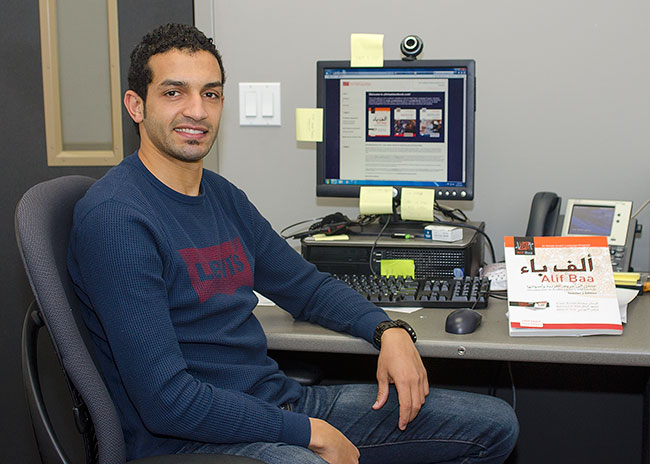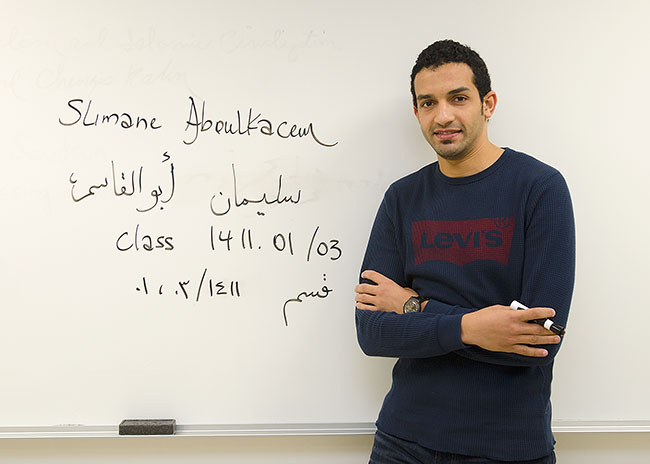Fulbright Scholar Continues Educational 'Odyssey' At SHSU
Jan. 8, 2014
SHSU Media Contact: Jennifer Gauntt
Story By: Linda Gilchriest
 |
| Algerian-born Slimane Aboulkacem is visiting SHSU through May as part of the Fulbright Scholarship Program, which encourages cultural exchange by placing professors and students internationally to teach, attend classes and learn about their host country. He teaches classes in his native language, Arabic, through the foreign languages department and is taking classes in political science and research in teaching. —Photos by Brian Blalock |
Slimane Aboulkacem walks down the hallways of Academic Building IV at Sam Houston State University with an air of purpose. Behind his rich smile and lanky strut is a focused young man who has begun his odyssey of education in America.
Aboulkacem, 26, arrived on campus from his home in Algeria in August, just in time to sign up for two courses and to be assigned two classes to teach.
He is a Fulbright foreign languages teacher assistant, visiting SHSU through the Fulbright Scholarship Program, which places foreign teachers in U.S. colleges. The program is designed to expose American students to international cultures while allowing foreign teachers/students to experience college life in America.
The Fulbright experience has been a whirlwind adventure for Aboulkacem. His research for his master’s thesis brought him to the Fulbright website and the application page.
“I was sitting in front of my computer screen doing research work,” Aboukacem said. “At that time I was about to defend my thesis, my oral defense. I ran across it (the web page). My brother was sitting next to me and I showed him the screen and said, ‘Hey, what about we just go for it?’”
Aboulkacem completed the process and is one of a handful of young teachers selected to spend a year in America. He teaches Arabic classes at SHSU, a program within the foreign languages department that has quickly grown since it was added to the curriculum in 2004.
Aboulkacem teaches two classes, and another new professor, Samar Zahrawi, teaches four.
�They (the students at SHSU) are motivated, at least the ones I see. If they come to Arabic, they cannot come for fun; they come to know what is there and what they can learn about it." —Slimane Aboulkacem |
Aboulkacem said many in his Arabic language students are criminal justice and Middle Eastern studies students and are returning military.
“There are a lot of students asking about these classes,” he said. “They want to learn about it.”
Aboulkacem has his master’s degree in English linguistics and in marketing. Although he is skilled in English, it is not a language he said he heard much in his native Algeria.
“Algeria is the second-largest French-speaking country,” Aboulkacem said. “Everybody speaks French. My dad spoke French and my mom spoke Berber. Berber is the language of indigenous North African people. You find Berber people in Morocco, in Algeria, in Libya, in Egypt, basically all of North Africa.
“They (the Berber) came from Europe during the Roman Empire, or before. I was doing some research, and they say DNA results show they came from Scandinavian countries,” he said.
“Very few people (in Algeria) speak English. English is spoken in Algeria maybe 5 percent or less. People look at you weird if you speak English.”
Aboulkacem comes from a large family, with three brothers and two sisters. His mother takes care of the family and does local community service work.
“I grew up in a simple, poor family. I remember my dad, he is passed away now, and he was doing his best just to keep us all educated.”
Aboulkacem said his father would be pleased to know that his eldest son is a biologist and his oldest daughter is a teacher; he has a son working in human resources, a son in business and Aboulkacem, who plans on getting his doctorate. His youngest sister, Aziza, is 15 and the one most concerned about her brother coming to America, not because he was coming here, but that he would be gone for a year.
“We’re kind of close; she didn’t want me to leave her,” he said.
Having traveled a lot in Africa and Europe, Aboulkacem was not awed by his arrival at the airport in Washington, D.C. As part of the Fulbright experience, he met with a group of fellow scholars at Howard University for orientation before coming to Huntsville. He said his reception here has been outstanding.
“My impression is good. Here at the university, I have nothing bad to say about the people,” he said. “They are kind people. They have helped me settle down. They have helped me get accustomed to my environment. I face no difficulty here, no problem here at all. Everybody is helpful.
“Dr. Debra Andrist, head of the foreign languages department, has been a wonderful and very helpful supervisor. She always pushes me to outperform and make the most of my stay,” he said.
Aboulkacem said he saw America as his first step into a good professional career.
“In the U.S., I’m going to know lots of people; I’m going to learn lots of things. I’m going to know the culture,” he said. “I am going to verify the clichés most people have about the U.S. that are conveyed by the media.”
Aboulkacem said he takes an intellectual approach to these stereotypes of America, especially those portrayed by the U.S. media and in the news.
 |
| While less than 5 percent of people in Algeria speak English, Aboulkacem has a master's degree in English linguistics. The official language of Algeria is Arabic. Algerians also speak Berber and French, and the country is the second-largest French speaking country in the world. |
“I travel a lot in North Africa and Europe, and I have American friends and European friends. I know how people are. The government has nothing to do with people and how people are. Foreign policy is made by the government; it is not made by the majority. So right at the very beginning, I got the right idea about Americans.
“Being an intellectual, I believe, you have to do your research,” the young teacher said. “We know how the media can manipulate and can change people’s minds. There are thousands of examples in history. You have no right to judge somebody, if you are an intellectual, based on what the media says. You have to go into some books. You have to ask scholars. You have to do some research. This is a job. You are not a simple person.”
Aboulkacem is impressed with his students here at SHSU.
“They are motivated, at least the ones I see. If they come to Arabic, they cannot come for fun; they come to know what is there and what they can learn about it,” he said.
“I think students in Algeria are more motivated than here, mainly because in Algeria, we don’t have all these means (money, learning facilities and technology). Access to knowledge is very difficult. You don’t find this big library (like the one at SHSU),” he said. “Here, if I want an article, I order it and it is here. That would never happen in Algeria. You would never get an article delivered to your office where you can read it, print it and use it for research. We have small libraries.”
His goal while at SHSU is to expand Arab education through campus events that will introduce more students to the culture. He said he and members of the Arabic conversation group hope to put on one of these events in the spring.
On the academic side of his Fulbright scholarship, Aboulkacem is taking classes in political science and research in teaching. His long-term goal is to get his doctorate from a university in the U.S. or Great Britain.
While he has his eye on the prize, he also has a sense of obligation to give back to Algeria, although his return may be delayed if he is accepted into a doctorate program in the States.
“I want to pay back my university duties,” Aboulkacem said. “They are not like physical duties, but moral duties. We have education for free at all levels. So I feel like I kind of owe my university to do this, to give back. They oblige us to go back for two years, but we can come back (to America) as students or tourists. What I am planning is to giving back for my experience for maybe three or four years.”
Aboulkacem will be at the university through the spring semester. Along with his teaching and studies, he will be volunteering as a youth assistant basketball coach.
- END -
This page maintained by SHSU's Communications Office
Associate Director: Julia May
Manager: Jennifer Gauntt
Located in the 115 Administration Building
Telephone: 936.294.1836; Fax: 936.294.1834
Please send comments, corrections, news tips to Today@Sam.edu.

 SamWeb
SamWeb My Sam
My Sam E-mail
E-mail

